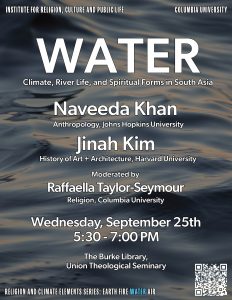 Last week, the Burke Library staff collaborated with the Institute for Religion, Culture, & Public Life (IRCPL) to host a panel discussion on the role of water in religion and spiritual life in South Asia. “Water” was the 2nd event this year in IRCPL’s “Religion & Climate” series. Attendees from Columbia and Union Theological Seminary as well as guests were invited. The discussion between Prof. Naveeda Khan (Anthropology, Johns Hopkins University) and Prof. Jinah Kim (History of Art and Architecture, Harvard University) was moderated by Dr. Raffaella Taylor-Seymour (IRCPL).
Last week, the Burke Library staff collaborated with the Institute for Religion, Culture, & Public Life (IRCPL) to host a panel discussion on the role of water in religion and spiritual life in South Asia. “Water” was the 2nd event this year in IRCPL’s “Religion & Climate” series. Attendees from Columbia and Union Theological Seminary as well as guests were invited. The discussion between Prof. Naveeda Khan (Anthropology, Johns Hopkins University) and Prof. Jinah Kim (History of Art and Architecture, Harvard University) was moderated by Dr. Raffaella Taylor-Seymour (IRCPL).
It’s hard to overstate the vital importance of water in discussions of climate change, and its role in the public life of religion. This conversation, amidst the glow of chandeliers in our main Reading Room, touched on a wide range of themes, from representations of water in the history of art including centuries-old paintings as well as popular films such as the Mad Max franchise, to the geography of water and the role of colonialism in climate disasters. Prof. Kim discussed her ongoing interdisciplinary project Water Stories: River Goddesses, Ancestral Rites, and Climate Change at Harvard, and invited audience members and their communities to share their stories on the project’s website.

The events in the Religion and Climate series have been constructed with the specific aim to critically inspect the nature of religion itself as part of urgent issues affecting our planet. “IRCPL’s Religion and Climate series,” as described vividly on IRCPL’s website, “is animated by calls to reimagine human relationships with and responsibilities to the environment in an age of planetary crisis. As the impact of climate change is increasingly but unevenly felt, religion is emerging as a site of epistemological doubt, struggle, and possibility. This series will explore the cosmological underpinnings that shape diverse understandings of the environment and examine how religious subjects react to and act upon the ecological upheavals they face, challenging exclusively technocratic or secular responses to the climate crisis. The series will begin with four events structured around the elements—Earth, Fire, Water, and Air—each of which will take one element as a lens for engaging with specific climate struggles and the religious debates they ignite.” The next event in the series, “Fire,” on November 19th, will take place on Zoom — you register to attend here. CB